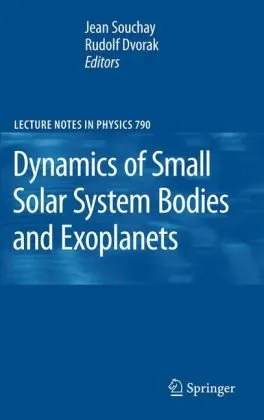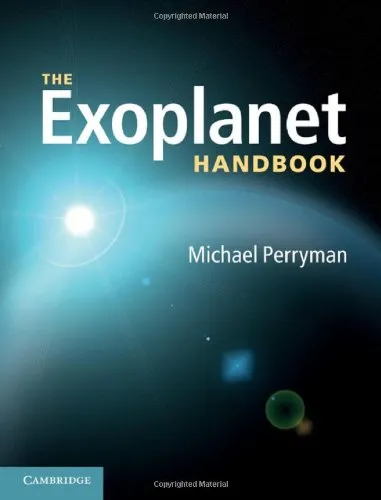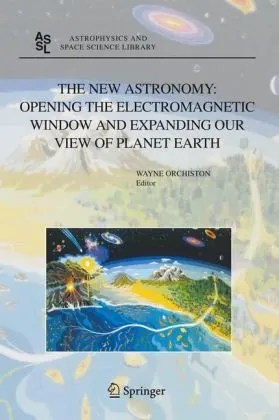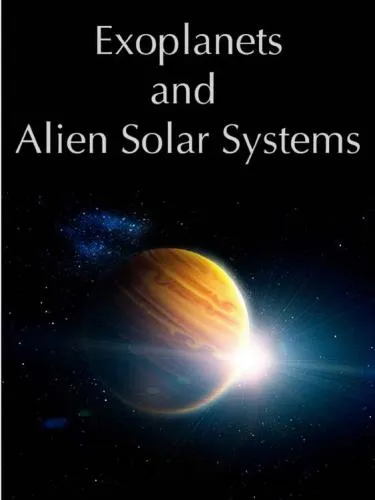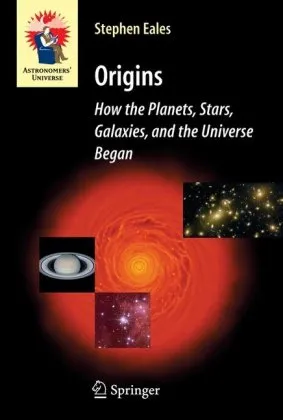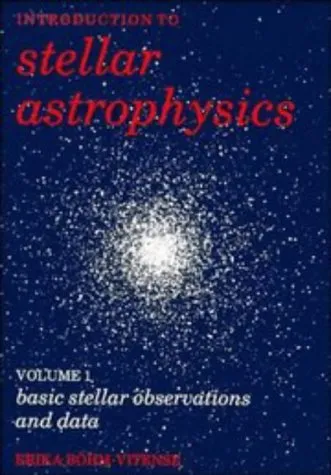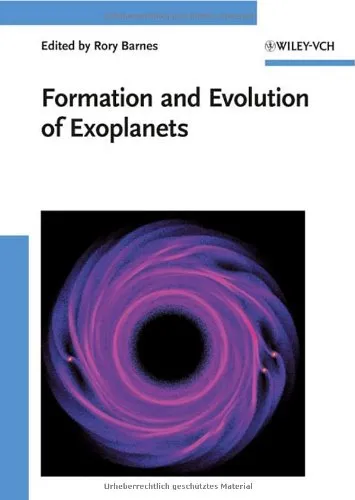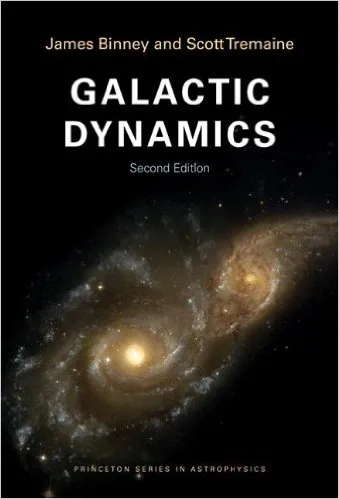Dynamics of Small Solar System Bodies and Exoplanets
4.0
بر اساس نظر کاربران

شما میتونید سوالاتتون در باره کتاب رو از هوش مصنوعیش بعد از ورود بپرسید
هر دانلود یا پرسش از هوش مصنوعی 2 امتیاز لازم دارد، برای بدست آوردن امتیاز رایگان، به صفحه ی راهنمای امتیازات سر بزنید و یک سری کار ارزشمند انجام بدینکتاب های مرتبط:
معرفی کتاب دینامیک اجسام کوچک منظومه شمسی و سیارههای فراخورشیدی
کتاب Dynamics of Small Solar System Bodies and Exoplanets یکی از منابع کلیدی و معتبر در حوزه اخترفیزیک و دینامیک سیارهای به شمار میرود. این اثر با ویرایش ژان جی. سوچای و رودولف دووراک، مروری جامع و تحلیلی بر رفتار و دینامیک اجرام کوچک منظومه شمسی مانند سیارکها، دنبالهدارها، و بیش از همه، سیارههای فراخورشیدی ارائه میکند. هدف اصلی این کتاب بررسی دینامیک اجرام ساده و در عین حال پیچیدهای است که پدیدههای جالب اخترشناسی در مقیاسهای مختلف را رقم میزنند.
این کتاب برای پژوهشگران، دانشجویان، و هر کسی که علاقهمند به مطالعه تأثیرات گرانشی، سیستمهای چندجرمی، و کشفیات جدید در حوزه نجوم و سیارههای فراخورشیدی باشد، اثری ارزشمند است. در ادامه به بخشهای مختلف این معرفی میپردازیم.
خلاصهای تفصیلی از کتاب
این کتاب در چند بخش اصلی سازماندهی شده است. ابتدا، مدلهای پایهای دینامیک و معادلات حاکم بر حرکت اجرام کوچک منظومه شمسی ارائه شدهاند. سپس، مثالهای مختلفی از سیارکها و سیستمهای دوگانه مورد بررسی قرار میگیرند. بخش بعدی به تحلیل پایایی یا ناپایداری مدارها در منظومه شمسی و پدیدههای بینظمی در سیستمهای گرانشی چندجرمی میپردازد. در بخش دیگری از کتاب نیز به بررسی رفتاری سیستمهای سیارهای در کهکشانهای دور اختصاص داده شده است، جایی که سیارههای فراخورشیدی و کشف الگوهای جاذبهای مورد بحث قرار میگیرند.
یکی از نقاط قوت کتاب این است که نه تنها بحثهای نظری عمیقی را شامل میشود، بلکه با دادههای بهروز، آمارههای مدرن، و شبیهسازیهای کامپیوتری نیز همراه است. این ترکیب از مباحث نظری و عملی، کتاب را به منبعی منحصر به فرد برای پژوهشگران تبدیل کرده است.
نکات کلیدی استخراج شده از کتاب
- درک بهتر از مکانیک اجرام کوچک و نیروهای غالب بر حرکت آنها.
- روشهای کاربردی برای محاسبه پایداری مدارها و پدیدههای کائوتیک.
- بررسی سیستمهای چندجرمی و مشارکت این بررسیها در کشف سیارههای جدید.
- ترکیب دادههای کشفشده با تئوریهای دینامیکی برای پیشبینی رفتار اجرام آسمانی.
- تجزیهوتحلیل علمی حرکات و خواص دینامیک سیارات خارج از منظومه شمسی.
جملات معروف از کتاب
"The structure and dynamics of a planetary system reveal not only its past but also allow predictions about its future developments."
"Studying the smallest members of the Solar System is crucial for understanding the biggest questions of celestial mechanics."
چرا این کتاب اهمیت دارد؟
کتاب Dynamics of Small Solar System Bodies and Exoplanets از چند جهت ارزشمند است. نخست، این کتاب پل جدیدی بین مشاهدات عملی و نظریهها میزند و به دانش ما در مورد والیوم گستردهای از اجرام کوچک و سیارات دوردست میافزاید. دوم، کتاب برای افرادی نوشته شده است که نه تنها پژوهشگران حرفهای هستند، بلکه علاقهمندان و دانشجویانی نیز هستند که میخواهند درک عمیقی از ساختار و رفتار اجرام در منظومه شمسی و فراتر از آن داشته باشند.
همچنین، معرفی مدلهای پویشی جدید و استفاده از آخرین نتایج حاصل از ماموریتهای فضایی و دادههای زمینی، این کتاب را به منبعی منحصر بفرد تبدیل کرده است. محتوای آن هم برای آموزش و هم برای تحقیقات علمی پرکاربرد است. به علاوه، این کتاب کمک میکند که شناخت ما از چگونگی شکلگیری و تکامل جهان افزایش یابد.
Introduction to "Dynamics of Small Solar System Bodies and Exoplanets"
The book "Dynamics of Small Solar System Bodies and Exoplanets" is a comprehensive exploration of the celestial mechanics, dynamical phenomena, and interdisciplinary challenges associated with small bodies in the solar system and exoplanets orbiting distant stars. Authored by the esteemed astronomer A. Lemaître, and edited by Jean J. Souchay and Rudolf Dvorak, this work provides a robust foundation for researchers, students, and enthusiasts interested in the intricate behavior of these fascinating objects.
Detailed Summary
The field of celestial mechanics has evolved significantly over the past few decades, driven by advances in observational techniques and computational methods. Dynamics of Small Solar System Bodies and Exoplanets seeks to bridge traditional theoretical approaches with modern discoveries, offering readers a unique perspective on the motion and interaction of small celestial bodies—asteroids, comets, and Kuiper Belt objects—and planets outside our solar system.
The book is divided into sections that elucidate the fundamental principles governing orbital dynamics, non-linear effects, resonance phenomena, and chaos theory. It covers critical topics like the Yarkovsky and YORP effects, tidal interactions, planetary migration, and the influence of stellar radiation. Additionally, a dedicated portion of the book explores the fascinating variety of exoplanets discovered over the past 30 years, including their formation, stability, and potential habitability.
What sets this book apart is its interdisciplinary approach, integrating astrophysics, planetary science, and applied mathematics to present a holistic view of celestial dynamics. Whether discussing collision probabilities between celestial bodies or the intricate gravitational perturbations influencing exoplanetary orbits, the authors strike a delicate balance between theoretical clarity and physical intuition.
Key Takeaways
- The solar system is a dynamic laboratory, showcasing the role of non-linear dynamics, resonances, and chaos in shaping the orbits of small bodies.
- Advanced mathematical and computational techniques are indispensable for modeling complex celestial systems, both within and beyond our solar system.
- The study of exoplanets offers profound insights into planetary formation, evolution, and the potential for life in the universe.
- Orbital perturbations, impacts, and gravitational influences govern the long-term stability and behavior of small solar system objects.
- The intricate interplay between planetary and solar forces reveals the delicate balance required for celestial bodies to maintain their orbits.
- Exploring exoplanetary dynamics highlights the diversity of planetary systems and their implications for astrophysical research.
Famous Quotes from the Book
"The motions of the smallest bodies in our solar system, though seemingly insignificant, often hold the key to understanding the grander structure of planetary systems."
"In celestial mechanics, simplicity is often an illusion—chaos arises where order begins, and the unexpected becomes the rule, not the exception."
"Exoplanets allow us to expand our imagination beyond the confines of our solar neighborhood, offering glimpses into the infinite diversity of worlds beyond."
Why This Book Matters
The importance of studying small solar system bodies and exoplanets cannot be overstated. These objects provide invaluable clues about the origins and evolution of our solar system and the broader universe. The study of asteroids and comets, for instance, helps us understand planetary formation, while the fascination with exoplanets opens up possibilities for discovering extraterrestrial life and understanding planetary habitability.
Beyond its scientific contributions, Dynamics of Small Solar System Bodies and Exoplanets serves as an essential resource for building cross-disciplinary bridges. By integrating celestial mechanics, physics, and astronomy, the book equips readers to tackle complex questions about the behavior of celestial systems. Its rigorous yet accessible treatment of the subject makes it a must-read for those pursuing careers in astronomy, as well as for anyone fascinated by the dynamics governing our celestial neighborhood and worlds far beyond.
Contributing significantly to our understanding of the cosmos, this book emphasizes the importance of continued exploration and research, inspiring the next generation of scientists and thinkers.
دانلود رایگان مستقیم
شما میتونید سوالاتتون در باره کتاب رو از هوش مصنوعیش بعد از ورود بپرسید
دسترسی به کتابها از طریق پلتفرمهای قانونی و کتابخانههای عمومی نه تنها از حقوق نویسندگان و ناشران حمایت میکند، بلکه به پایداری فرهنگ کتابخوانی نیز کمک میرساند. پیش از دانلود، لحظهای به بررسی این گزینهها فکر کنید.
این کتاب رو در پلتفرم های دیگه ببینید
WorldCat به شما کمک میکنه تا کتاب ها رو در کتابخانه های سراسر دنیا پیدا کنید
امتیازها، نظرات تخصصی و صحبت ها درباره کتاب را در Goodreads ببینید
کتابهای کمیاب یا دست دوم را در AbeBooks پیدا کنید و بخرید
1389
بازدید4.0
امتیاز0
نظر98%
رضایتنظرات:
4.0
بر اساس 0 نظر کاربران
Questions & Answers
Ask questions about this book or help others by answering
No questions yet. Be the first to ask!
